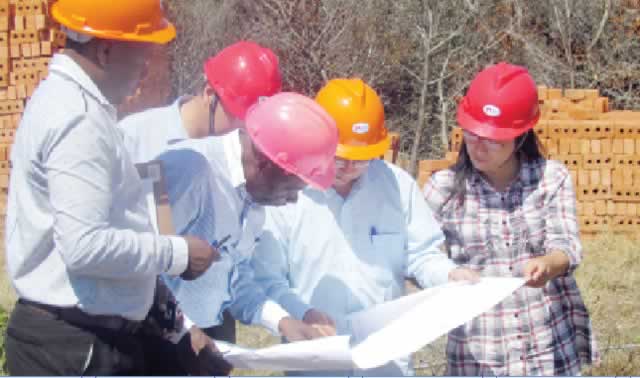Lupane’s provincial capital status spurs Jotsholo growth

Mhlaseli Sibangani Mpofu
The current blossoming of Lupane, Matabeleland North, from a donkey-infested, dusty rural service centre to a growing town after its timely declaration some years ago as the tenth, and probably the country’s last provincial capital, is not only a welcome initiative in Zimbabwe’s latest development discourse but also a major step in putting both the province and the district’s immediate environs in the broader development map as well.
Indeed following structural developments that include the imposing Lupane State University, a provincial hospital, Elitsheni Government Complex and Bubi-Lupane Dam, among a host of other structures at the centre, there have been timely and obvious overtures to downstream related development initiatives to Jotsholo Growth Point, the district’s second biggest urban set-up located 36 kilometres further north. The proponents of this school of thought are borrowing largely from the creation, some years ago, of Chitungwiza town, 25 kilometres away from Harare, which serves as the capital’s “dormitory town”, providing housing and other related socio- economic amenities to the workforce that serves and services Harare daily.
The proponents of this school of thought further state that towns like Ruwa and Norton, 25 and 40 kilometres away from Harare respectively, serve a similar purpose, arguing that they also serve as a welcome breather to the capital which is suffocating owing to the large population which could not be properly catered for in social services. It is not a secret that some of the residents of the towns mentioned above had failed to secure housing in Harare and opted out, joining thousands others who saw better opportunities in terms of housing and other related facilities outside the capital.
It is in the same light that I invite and implore politicians, planners, development agents, their partners and their immediate communities in the entire district of Kusile to view the growth and development of the provincial capital at Lupane as an opportunity that should in turn awaken and inspire the growth of Jotsholo and convert it into a vibrant and robust “extension” of Lupane.
It is equally important to note that of late there has been a systematic development of mining operations around Jotsholo and this development alone should serve as yet another catalyst to put Jotsholo in the broader development agenda as well.
Recent indicators and related Press reports have pointed at the strong possibility of Kusile Rural District Council offices relocating to Jotsholo to escape the suffocation, “strife and hurry” that should naturally be a characteristic of a demanding provincial capital.
It is not for me to ponder over the pros and cons of such a move but I will hasten to point out that there are silent moves to oppose such an adventure on the grounds that some local authorities operate from their provincial capitals for some strategic reasons that are, however, not the scope of this discussion. Indeed local authorities such as Gwanda RDC, (Matabeleland South), Umguza RDC (Matabeleland North), Mutare RDC (Manicaland), Beitbridge RDC (Matabeleland South) and Runde RDC (Midlands) operate from major urban centres in their vicinity or provincial capitals owing to reasons too numerous to mention here.
It is therefore incumbent upon planners involved in the Lupane-Jotsholo proposal cited above to cast their thoughts far and wide so that they are not caught flat footed when some unforeseen circumstances negatively crop up when the plan is in full swing. However, it is important to note that there are so many advantages likely to accrue if council offices relocate to the growth point, chief among them being commercial and infrastructural developmental activities which would apparently awaken Jotsholo from its current deep slumber.
The relocation would kick-start development and commercial activities that would earn locals employment in different sectors, moreso given that this relocation would increase income at Jotsholo which currently is known for small retail shops and noisy liquor outlets dotted here and there.
Jotsholo, declared a growth point in the early eighties alongside other sister areas such as Maphisa in Kezi, Murambinda in Buhera, Mpandawana in Gutu, Murombedzi in Zvimba and so on, through the Prime Minister’s Directive of 1984, was a thriving and lively centre boosted by income and structural development from the nearby Arda Estates. It without doubt badly needs a facelift, and surely the growth of the provincial capital should provide downstream socio-economic influences that should spur economic growth, employment opportunities and better incomes for people in the immediate communities.
Local MP Martin Khumalo has on several occasions pointed out that Kusile district does not have a government district hospital, pointing out that Jotsholo would be the safest bet for an institution of that magnitude.
However, it is the relocation of council offices that should attract the interest of the public for a number of reasons.
First, council is a planning authority that, in most cases leads other development partners such as government departments, parastatals and non-governmental organisations through a legal instrument commonly referred to as the Rural District Development Committee, (RDDC) which is a committee of council chaired by the District Administrator. In normal circumstances, the DA’s office, different government departments and council establishment are usually located within shouting distance of each other, owing to their functional relationship in terms of planning, supervising and championing development.
Secondly, when members of the public (some of whom travel about 100 kilometres) visit council offices to conduct business, they take the same opportunity to meet the DA at his office usually close by, an NGO, the local board probably to enquire about residential stands, Zinwa, or offices of a given political party for one reason or another.
In the scenario tabulated above, there is very little or nothing paid in transport fares to cover distances in between these offices geographically located in the same vicinity in Lupane, save for the journey from home to the centre, a situation which is ideal for every ordinary villager or ratepayer.
This brings forth a very interesting equation which, however, is very difficult to ignore. If council offices relocate to Jotsholo, what happens to their development partners named earlier in the article which are currently based in the provincial capital, and who for logistical reasons, might derive comfort there? Do they remain in the provincial capital? If they remain there, this will prove difficult for ratepayers, who, after being served at council offices at Jotsholo, would hitch- hike to get to the provincial capital to be attended to by staff from other development partners like NGOs and quasi-government departments.
The same would apply to those closer to the provincial capital, who, after getting service from council’s development partners, would embark on a 36 kilometre journey to Jotsholo and back, with the risk of failing to secure transport back home at the end of the day, making the enterprise very costly. It is in that light that it is necessary, during the planning stage to take care of all the “ifs” so that we include all the trade-offs which are usually a component which is too difficult to ignore in a list of conflicting priorities. As pointed out earlier, it is not the scope of this article to weigh the pros and cons of moving council offices to Jotsholo, but it is worthwhile to note that the generality of the Jotsholo populace is salivating at the prospect of having some government institutions moved to their growth point, while, at the same time, it is important to note that several factors have to be taken into consideration if this move is to bear fruit.
It is without any measure of doubt that residents of Jotsholo and their immediate environs would be excited by this worthwhile opportunity of having a number of offices moving to their small town as this would ensure a welcome “jump-start” likely to spur growth and bring about a number of opportunities. Be that as it may be, parties salivating at this prospect need to realize that there is a lot of ground-thinking involved so that this project may become a reality to be cherished at a cost though.
*The writer is a former journalist. He is a development consultant based in Bulawayo. He can be contacted at [email protected] or [email protected].








Comments